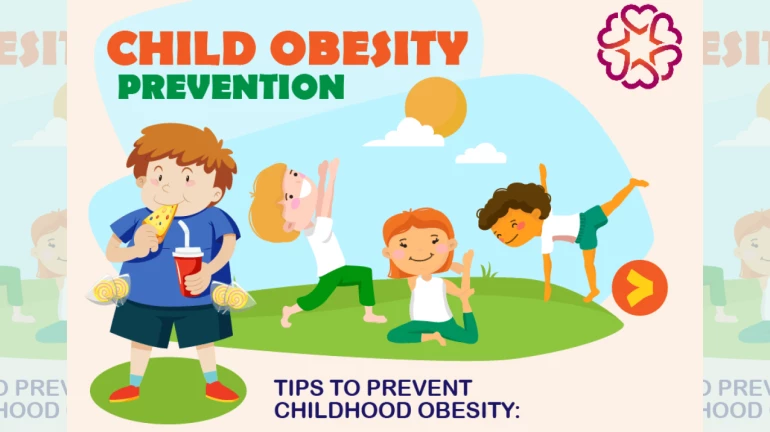
Are you aware of your child's daily dietary habits? It's not solely about the food they consume but a culmination of various elements contributing to issues like abdominal bulging, breathlessness, and elevated BMI. The rise in childhood obesity is a pressing global issue, influenced by a complex array of factors. The intricate dynamics among these elements present a substantial obstacle in tackling and averting pediatric obesity. Understanding this can help them now and in the long run, explains Dr. Jyothi Raghuram, Senior Consultant-General Pediatrics & Pediatric Rheumatology, Aster Women and Children Hospital.
Let’s explore obesity: What is normal and what is a red flag?
A Body Mass Index (BMI) below the 5th percentile for age is considered underweight, while a BMI between the 5th and 85th percentile is classified as normal weight. Children with a BMI between the 85th and 95th percentile are categorized as overweight, and those at or above the 95th percentile are considered obese.
Pediatric Obesity Puzzle: What are the factors at play?
Pediatric obesity often stems from a surplus of calorie intake over output, fuelled by unbalanced diets and the inversion of the food pyramid. Modern urban lifestyles contribute to a lack of physical activity, with congested living spaces limiting outdoor play. The culprits in diet, briefly referred to as "JUNCS” (Junk foods, Ultra-processed foods, Nutrition-deficient food, Caffeinated/ Colored/ Carbonated foods/beverages, and lastly Sugar-sweetened beverages), are at the core of pediatric obesity causation. Sometimes there are hormonal causes such as hypothyroidism or genetic causes leading to childhood obesity.
A Closer Look at Specific Trends and Their Contributing Factors
Busy lifestyles, the westernization of dietary habits, and the prevalence of ultra-processed foods contribute to the rising rates of childhood obesity. Frequent visits to malls, easy availability of fast foods, sedentary behaviors, and the perception of chubby children as healthy all play significant roles. The globalized nature of our society, exposure to diverse food cultures, and increased travel further compound these issues.
How the mother plays a role pre-conception and during pregnancy
Avoiding teenage pregnancy, taking Folic acid supplements pre-conception, expecting mothers to follow a healthy diet, and staying active during pregnancy is crucial to ensure a healthy pregnancy and baby. Adequate support from partner, and family members to the mother to promote breastfeeding is essential.
Nutritional ABCs: How to teach your preschoolers to snack smart
Overfeeding, reliance on formula milk (even when not necessary), and the introduction of packaged cereals during weaning contribute to childhood obesity. Strategies to prevent this include breastfeeding as recommended by WHO, avoiding force-feeding, and encouraging self-feeding with a focus on a balanced diet rich in fruits, vegetables, and essential nutrients.
Addressing the Rise of Sedentary Habits in the Digital Age
The shift towards sedentary lifestyles, exacerbated by increased screen time, has become more prevalent, especially with parents working from home. Binge-watching coupled with unhealthy snacking contributes to the obesity epidemic. Loss of quality time during shared family meals and mindless eating habits coupled with screen time further worsen the situation.
Lights Out, Pounds Off: Understanding the Weight Loss Benefits of Quality Sleep
Quality sleep is integral to growth, with poor sleep linked to increased sugar intake, leading to obesity. Interventions such as sleep training, maintaining regular sleep times, and identifying treatable causes (such as adenoid enlargement causing sleep apnea) contribute to preventing sleep-related obesity issues.
The Impact of Diet Quality
The quality of a child's diet not only influences weight but also affects overall growth and development. Poor diets can lead to malnutrition, sluggishness, and academic performance issues, setting the stage for adult-onset diseases. Barker's hypothesis emphasizes the link between low birth weight and adult diseases. Sugary beverages increase the risk of dental issues, obesity, and hyperactivity. Controlling portion sizes, allowing children autonomy in deciding portions, and following the food pyramid contribute to a healthier diet.
Parents and Caregivers as Role Models
Parents and caregivers play a crucial role as role models, emphasizing healthy eating habits, regular exercise, and a caring attitude toward the underprivileged. Encouraging children's involvement in food preparation instills valuable life skills. Parents should prioritize their children's needs, avoiding shortcuts and wasteful practices. Involving children in food preparation, adhering to traditional food practices, and instilling independence in older children through basic cooking skills contribute to a lifelong commitment to health.
Schools play a role too
Schools play a vital role in educating children about nutrition, providing healthy meals, and creating a conducive environment for physical activity. Children spend a significant amount of time at school, typically around six to seven hours each day, and this includes a meal (lunch) and snacks. Initiating mindfulness and implementing clear nutritional labeling on cafeteria foods is the first step in promoting healthier food choices.
In conclusion, tackling pediatric obesity requires a holistic approach involving parents, caregivers, schools, and healthcare professionals. By addressing various factors, from lifestyle trends to feeding practices, society can work collectively to ensure a healthier future for the younger generation.





